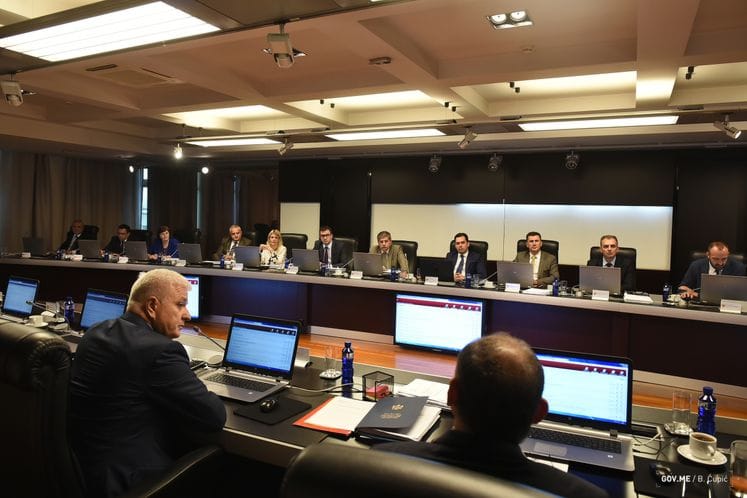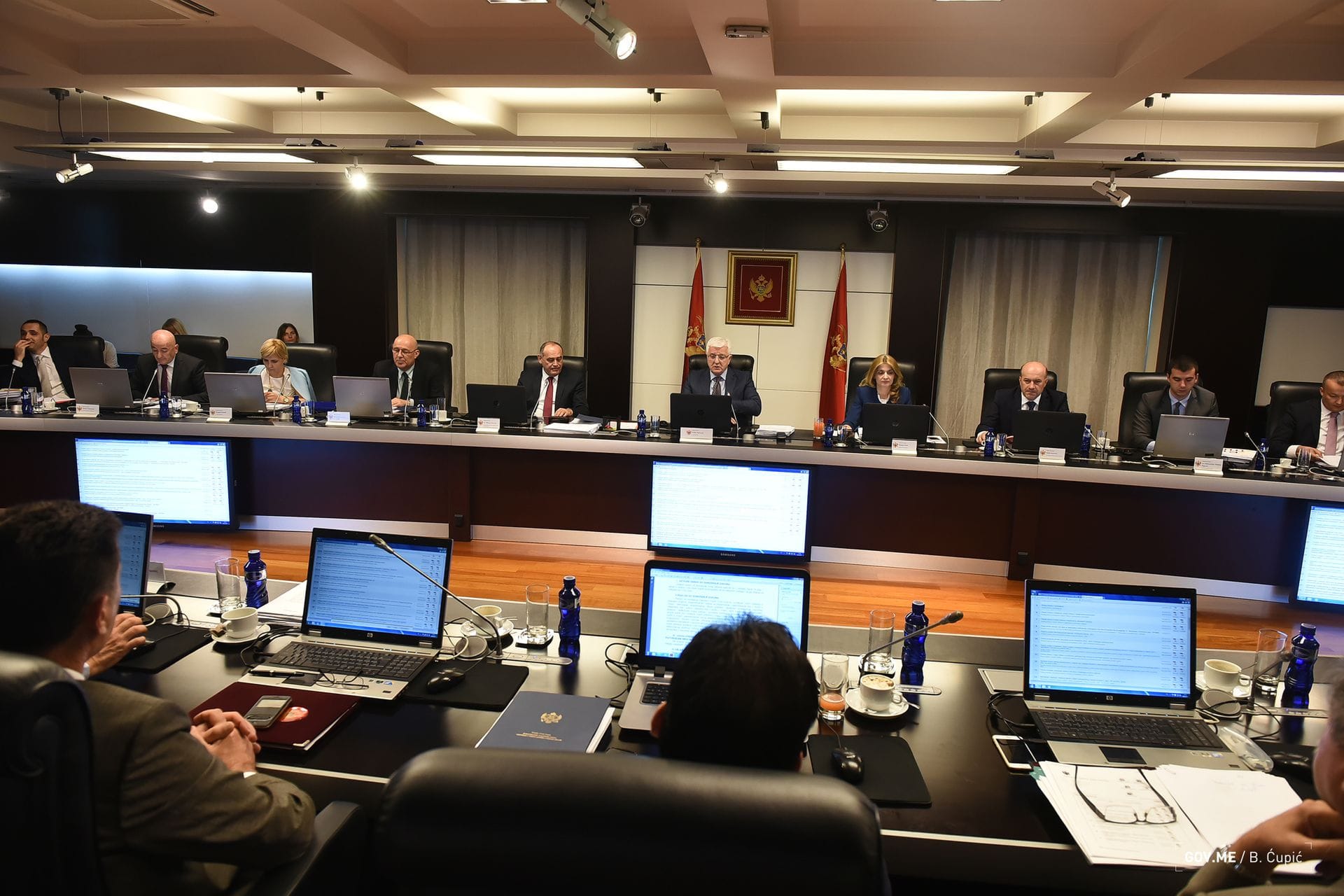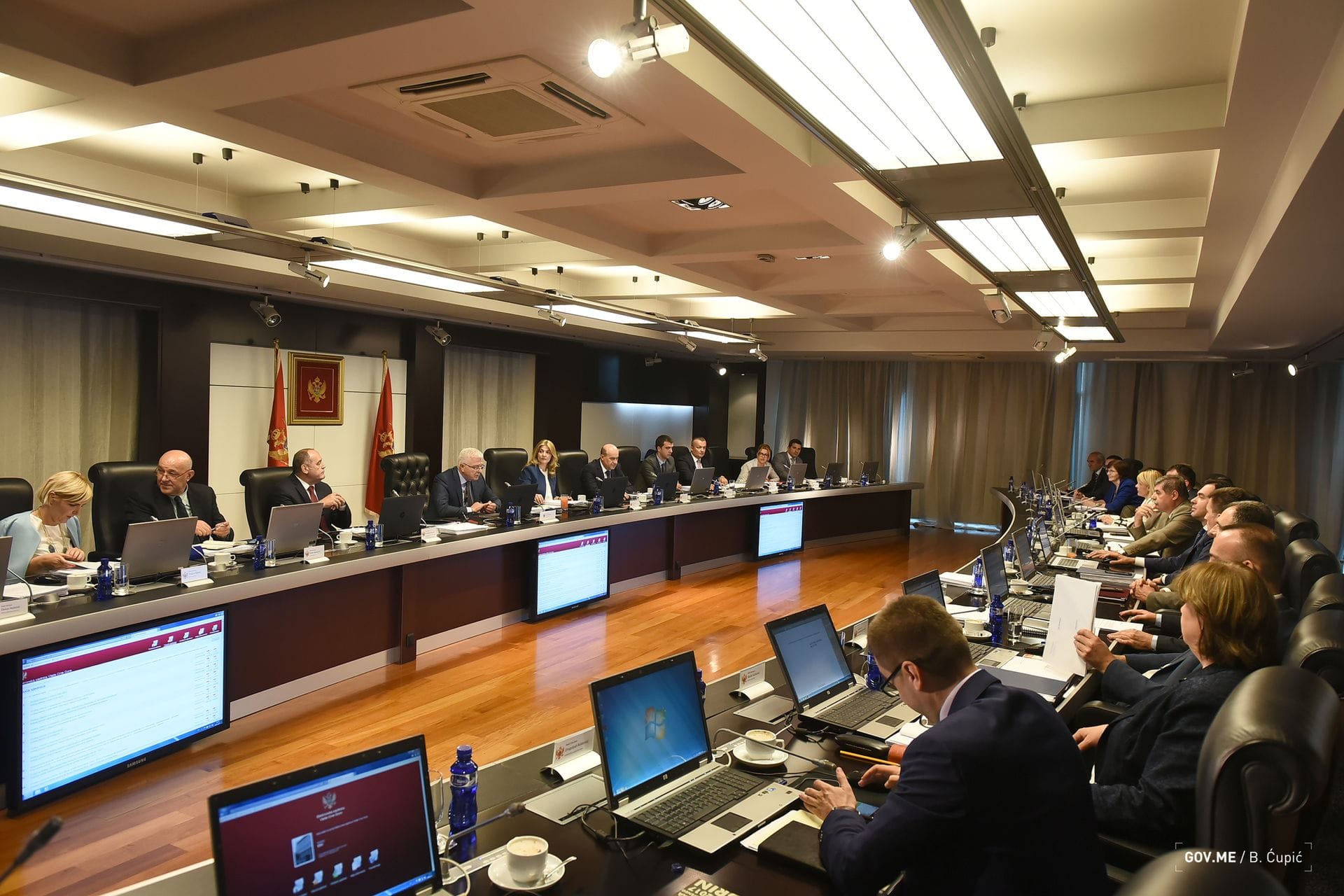- Government of Montenegro
Cabinet holds its 32nd session
Cabinet holds its 32nd session



The Cabinet, at its 32nd session held on 30 June 2017, chaired by Prime Minister Duško Marković, adopted the Draft Law on the Army of Montenegro. The proposed law regulates organisation and service in the Army. In the discussion, special attention was paid to provisions specifying the military obligations of the citizens of Montenegro: the establishment of records of conscripts, the introduction of voluntary military service under arms in times of peace and training and engagement of conscripts in times of war or emergency. In this context, it was estimated that these legal solutions, among other things, will contribute to the affirmation of the Army as one of the symbols of the identity and sovereignty of Montenegro. The proposed solutions include, among other things, a "merit" system in the admission procedure, promotion and election for education and training of persons serving in the Armed Forces, thoroughly prescribing the integrity and rights and obligations of the persons serving in the Armed Forces of Montenegro. The Law regulates more closely military-police affairs, the jurisdiction of the Military Police and the use of coercive means, the use of weapons by military personnel and wearing of military uniforms, it defines new conditions in the service and establishes a new system of assessing persons serving in the the Armed Forces.
The Cabinet adopted Draft Law on the Prevention of Violence and Misbehavior at Sports Events. By enacting this law, among other things, conditions are created for protection against abuses that are contrary to the nature of sports. The Law standardises rules for the behavior of all participants in sports events, and sets out unique system of prevention and reduction of the risk of disorder and misconduct at sports events. The new law implements the institutes of international law in this field, in particular the standards of the European Convention on Violence and Misbehavior of Viewers at Sports Events, especially when it comes to football matches. Among the solutions proposed by this law are the expansion of the obligations of the organiser of the event and precisely prescribed measures that the organiser should take to prevent violence and misconduct at sports events. The new law, as violence or misbehavior, recognizes, amongst others, disorderly and insulting conduct of the athletes at the sportss event against viewers, judges or officials; throwing on a sports ground or towards viewers the objects that could endanger the life and physical integrity of a person or property; provoking hatred or intolerance which can lead to a physical conflict of participants in sports event; placing or highlighting banners, flags, or other material with text, image, sign, or other feature which invokes or encourages armed conflict or violence, hatred or intolerance, national or racial discrimination, or discrimination based on religion, gender or sexual orientation, or on another basis; causing disorder when arriving, or leaving a sports facility or at a sports facility; inviting or encouraging a fight or assault on police officers, persons performing security duties, official persons in charge of organising competitions, competitors or other participants in sports event.
The Cabinet also adopted the Draft Law on Amendments to the Law on Amendments to the Law on Misdemeanors, which improves certain provisions in order to eliminate certain shortcomings, specifies the content of the misdemeanor warrant and harmonises it with incentive measures in order to make them more efficient. The most important changes relate to determining the possibility that a fine of up to twice the maximum can be prescribed by a regulation of the Government, and more severe penalties are foreseen for offenses committed in the field of application of international restrictive measures. The obligation to conduct a misdemeanor procedure has been extended without a hearing after filing a request for judicial decision on the issued misdemeanor warrant for minor offenses.
In line with the obligations arising from the Stabilisation and Association Agreement and the EU Services Directive in the internal market, the Cabinet adopted the Draft Law on Services. The application of the new Law will enable administrative simplification in this area, removal of barriers for access to the market for services, establishment of a unique contact point in order to provide easy access to information electronically, and that all jobs can be done in one place. The institute of freedom of cross-border provision of services is introduced by a business entity established in the state of the European Economic Area. In addition, the level of users' safety and quality of services is raising, facilitating the cooperation between the competent authorities of the European Economic Area member states through the information system of the internal market and the suppression of the grey economy.
The Cabinet also adopted the Draft Law on Chemicals, which comprehensively regulates the field of safe chemical management, especially in the part relating to inspection control.
The Cabinet adopted the Draft Law on Amendments to the Law on the Regularisation of Informal Facilities, which envisages the beginning of its application for 31 December 2017. The discussion explains that intensive work is being done on drafting the Law on Planning and Construction, which seeks to establish a new and comprehensive policy in the field of building planning and construction, including the issue of illegal construction.
In order to harmonise with the Law on Administrative Procedure, the Cabinet adopted the Draft Law on Amendments to the Law on Construction Products.
The Cabinet adopted the Spring Analysis of Macroeconomic Trends and Structural Reforms – 2016 –Q1 2017. The analysis shows, among other things, the growth of exports, economic growth in the first quarter of 2017, as well as a strong increase in the employment rate, increase in average net wages and pensions, in May 2017, a surplus of the budget for the first time, as well as the fact that the citizens of Montenegro have EUR 1.6 billion in savings in domestic banks. During the discussion, it was concluded that the implementation of fiscal consolidation measures, defined by the Measures for Remediation of Budget Deficit and Public Debt 2017-2021, gives positive effects, which are already visible in the first quarter of 2017. (More details on this item are available here)
The Cabinet adopted an updated version of the Public Finance Management Reform Programme 2016-2020 with the Action Plan. The Innovated Programme includes three new areas: state aid, customs and audit of funds from EU funds, which will enable better coordination and monitoring of the development of the public financial management system.
An updated Single List of Priority Infrastructure Projects was adopted, with the aim of further consideration of the possibilities of co-financing projects, as well as the revision of the degree of maturity of projects from the list adopted at the end of 2015 in line with the recommendations of the European Commission.
The Cabinet adopted the Water Management Strategy, which ensures continuity in the long-term planning of the functioning of this sector on the principle of sustainable development, including the regulation and use of water, the protection of pollution water, as well as the regulation of watercourses and protection against harmful effects of water pollution. The Strategy is a document on the basis of which water sector reforms will be implemented in order to achieve the necessary standards in water management, with organisational adjustment and systematic strengthening of professional and institutional capacities at the national and local level.
The Report on the Implementation of the Action Plan of the Regional Development Strategy of Montenegro 2014-2020 for 2016 was adopted. As stated in the Report, a total of EUR 492,343,802 was invested in the last year for the implementation of the 562 development projects, of which almost 208 million euros or 42 percent for the Northern Region, about 137 million or 28 percent for the Central Region, and about 147 million for the Coastal Region.
The Cabinet adopted the Decision to amend the Decision on determining the annual number of licenses for temporary residence and work of foreigners for 2017, due to expressed needs of the tourism industry, the annual quota for the current year is increased by 5,000 licenses, which will enable the successful performace in the summer season. The discussion emphasised that reform activities in the field of vocational education and labour market should result in a quality offer of the currently lacking domestic professional profiles that will replace the need for labour force from abroad.
Information on the realisation and effects of policies in the field of entrepreneurship and business was adopted for the period from 1 April to 30 June 2017. On this occasion, several conclusions have been drawn that specify the obligations of the competent institutions in order to implement the active policies of the Government in this area. Among other things, the Employment Agency of Montenegro is in charge of forming an implementation unit that will deal with the stimulation of entrepreneurship in terms of: preparing unemployed persons from the register of the Business Bureau, supporting the development of business plans and registering business activities, support and mediation in obtaining loan funds from the Investment and development fund of Montenegro, and all other activities aimed at encouraging these persons to take the matter into their own hands and to resolve their existence.
The Cabinet appointed the Public Administration Reform Council composed of: Zoran Pažin, Deputy Prime Minister of the Government of Montenegro for Political System, Internal and Foreign Policy – President of the Council, and: Suzana Pribilović, Minister of Public Administration; Darko Radunović, Minister of Finance; Aleksandar Andrija Pejović, Minister of European Affairs; Nataša Pešić, Secretary General of the Government of Montenegro; Aleksandar Bogdanović, President of the Executive Board of the Union of Municipalities of Montenegro; Svetlana Vuković, Director of Human Resources Management; Biljana Papović, representative of non-governmental organisations, proposed by the Center for Democratic Transition and Stevo Muk, representative of non-governmental organizations, proposed by the Institute Alternative – members of the Council. Vatroslav Belan, former first adviser at the Embassy of Montenegro in the People's Republic of China, was appointed as Adviser to the Deputy Prime Minister for Economic Policy and Financial System and as the National Coordinator of "12 Measures to Boost Cooperation between the People's Republic of China and Central and Eastern European Countries". Božidar Vuksanović, Dževat Redžematović, Zdravko Mitrović, Dragomir Dulović and Dragoljub Bulatović were appointed as members of the Board of Directors "Aerodromi Crne Gore" AD (Airports of Montenegro) – Podgorica. Alija Košuta was appointed as Acting Director of the Directorate for Inspection Affairs.
PUBLIC RELATIONS SERVICE OF THE GOVERNMENT OF MONTENEGRO
